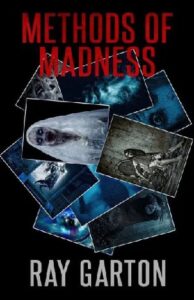
Dr. Krusadian’s Method: An Appreciation of Ray Garton
On April 21, 2024, the horror community lost another revered member. Ray Garton was a respected and beloved writer whose upbringing played an important role in his choice of genre. An adopted child, he was sent to religious schools and brought up in the Seventh-day Adventist Church. Sermons about the apocalypse instilled in him a fear that segued into exploring horror fiction and films as an outlet: a facing of fears in a comfortable and removed setting. He indicated that it wasn’t his intent to write horror but accepted it was highly compatible with his history and sensibilities. In essence, Garton related aspects of his life under a genre umbrella. His short novel Dr. Krusadian’s Method (1990) delves into one of the unholiest of horrors, child abuse. The visceral narrative is punctuated with scenes that are painful to read. And that’s part of its harrowing power.

At nine years old, Jason has endured innumerable beatings and psychological torment. There is no joy in his life, he metaphorically walks on eggshells to avoid situations that will lead to confrontations. Whatever precautions he takes are, of course, futile. After a hospitalization for a broken arm, Jason is returned to his hostile household. The abode where his parents violently bicker, binge drink, and pretend that their behavior towards each other and their child is normal. While the father is overtly the abuser-in-chief and the mom is at the outset presented as his enabler, there is more to their stories. Daddy seriously gets off on hurting others and Mommy’s wrongdoing goes beyond vile inaction. Into the fray comes Dr. Krusadian, who the parents believe was sent by the attending physician at the hospital to evaluate and report on Jason’s recovery.
Krusadian’s therapy is unorthodox. It harnesses memories that have been suppressed and transforms them into entities with agendas. Jason’s many remembrances are chilling. A Christmas memory is terrifying and belies the holiday spirit: “The Christmas Jason accidentally broke an ornament on the tree and his dad stripped all the ornaments from the branches, cornered Jason in the living room and pelted him with the brightly colored bulbs, shattering them on his head and face and hands, inflicting small cuts that opened like new eyes and cried tears of blood…” But the recurring recollection that haunts the boy is about his other parent: “And through it all, one image returned again and again: the sight of his mother cringing in the shadows or peering around a corner, looking, at first, as if she might step forward and scream for her husband to stop, might pull him off Jason and bring an end to the violence. But that look lasted only a moment and, each time, she retreated, backed away, disappeared silently to find a bottle and turn up the volume on the television set until the laughter and applause of a studio audience blanketed Jason’s screams.”
While there are implications that Jason’s parents contend with personal demons from their pasts, the father likely having been a victim of parental maltreatment in his childhood, this is not forgiven by Krusadian who points out that at some point the chain must be broken. Human monsters whose actions turn their progeny into copycat monsters cannot be excused from responsibility. And somewhere down the line, the abused offspring must be empowered to take command and halt the cycle. The purging of the emotional demons that were inflicted onto Jason exacts a cautionary retribution. There is no exit from the internal, rather than an infernal, hell for the perpetrators of abuse. Horror fiction satisfactorily rectifies in grim and shocking ways. One can only hope that writing the stunningly disturbing Dr. Krusadian’s Method was cathartic for Ray Garton (December 2,1962 – April 21, 2024), a Bram Stoker Award nominee for his 1986 novel Live Girls and recipient of the World Horror Convention Grand Master Award in 2006. His writing lives on and he remains in our hearts.

